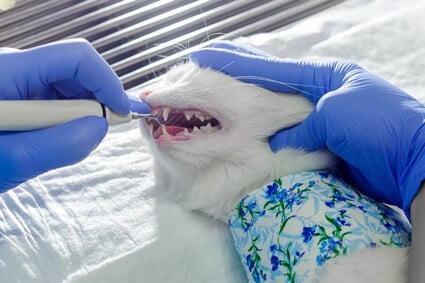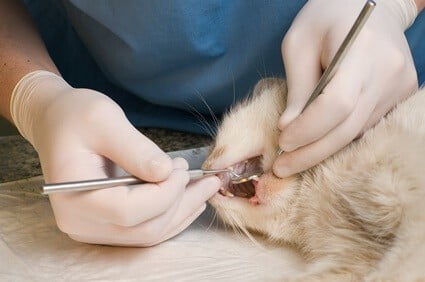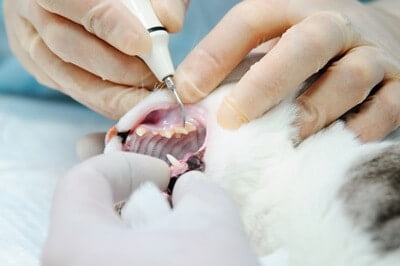Caring for cats’ teeth needs to be done, no matter how much your cat dislikes it. However, as your cat advances in years, you need to consider the dangers of professional teeth cleaning in senior cats.
Due to anesthesia, professionally cleaning an older cat’s teeth carries risk. Older cats often have health problems that can be exacerbated by being sedated, and sometimes the cat is unable to recover. If a cat is healthy and the vet gives the go-ahead, the benefits outweigh the risks.
Because of the health problems that persist in cats above a certain age, you’ll have to make some difficult decisions. Cat cavities are a serious issue, but so is being sedated for a procedure.
Do Cats Need Their Teeth Cleaned by a Vet?
Dental care is an overlooked part of feline maintenance, but it’s very important. To prevent mouth diseases and pain, cats should be taken to the vet for oral cleanings.
Many people believe that sugar is the only thing that causes cavities, but this isn’t the case with cats. According to the University of Pennsylvania, cats don’t have the taste receptors to enjoy sugar.
However, as we’ve learned, you can still develop cavities even if you don’t eat sugars. Consequently, cats are in danger of tooth decay if their teeth aren’t cleaned regularly.
Taking your cat to a vet for professional teeth cleaning is the best way to remove any plaque on your cat’s teeth. A thorough cleaning is needed to ensure that your cat’s teeth are clean and healthy.
How Do Cats Develop Dental Problems?
Bacteria from food build up on the surface of the teeth and forms plaques. The plaque then solidifies into tartar due to the minerals in saliva.
The tartar accumulates and spreads under and around the gums, leading to loss of gums and tissue, exposing the tooth, and ending with tooth loss.
The tartar on the gums causes a dental problem called gingivitis, and when the gums begin to degrade, it causes periodontitis.
According to Small Animal Practice, feline odontoclastic resorptive lesions are the most common dental problems in cats. It’s defined by the internal erosion of the tooth, resulting in a painful condition that leads to the loss of the tooth if it isn’t fixed.
The cause of FORLs isn’t fully known yet, but experts believe that plaque accumulation triggers a reaction of cells (known as odontoclasts) to dissolve the tooth structure.

Is Teeth Cleaning Safe for Older Cats?
Teeth cleaning is a big risk for older cats, but not because the procedure itself is a problem.
The concerns come from giving the cat sedatives for the vet to work on it. Anesthesia is necessary if the vet is to clean the cat’s teeth properly. However, the older the cat, the more problems will likely arise when it’s time to clean its teeth.
Older cats often have respiratory problems, heart disease, kidney and liver issues, and impaired motor functions. Being sedated while having these underlying issues is dangerous for an older cat because of how anesthesia affects bodily functions.
A common misconception is that anesthesia shuts off parts of the brain. In actuality, anesthesia changes how your brain receives and processes information by interrupting nerve signals.
These interruptions can cause permanent damage in the already debilitated brain of an elderly cat, resulting in complications like:
- Cardiac depression
- Motor impairments
- Long-term disorientation
- Cardiovascular shutdown
Of course, anesthesia mainly becomes a problem if your senior cat has any underlying issues.
Many cat owners with healthy older cats can take their pet to the vet for a teeth cleaning procedure year after year with zero problems. Before the procedure is done, the vet must first screen the cat for any issues.
If the vet deems the cat healthy enough, it can go under anesthesia. There are still risks involved due to how weak an elderly cat’s system is compared to a young one, but the risk tends to be lower.
Pros and Cons of Senior Cat Teeth Cleaning
Cleaning your cat’s teeth professionally is nothing but advantageous when your cat is young. However, one downside outweighs the benefits once your cat gets older.
Here are the advantages of senior cat teeth cleaning:
- Reduced likelihood of common dental diseases
- Less chance of future dental surgeries and removal
- Cat experiences less pain
- Cat will be able to eat solids for much longer
- Teeth problems can be detected earlier
As for the disadvantages of cat teeth cleaning for senior cats, it’s just the risk of health complications.
Even though the positive aspects of teeth cleaning seem to outweigh the one bad aspect, you should still think long and hard before deciding.
Even if you decide that teeth cleaning is a must for your elderly cat if the vet says no, little can be done about it. Sometimes, extracting your cat’s teeth is the best option. This might not sound like a solution, but you have to remember that cats don’t think the same way we do.
We may grieve the loss of a tooth due to cosmetic reasons, discomfort, or inconvenience. However, as long as cats can still go about their lives normally, the loss of teeth isn’t that important.
Can I Clean My Cat’s Teeth Myself?
You can brush your cat’s teeth, but you can’t perform a full dental cleanup.
It’s almost impossible to get a cat to cooperate enough to reach all of its teeth. If you do the cleaning yourself, you’ll not be able to remove all the plaque, so the risks of oral diseases will remain.
You could accidentally hurt your cat when trying to clean its teeth thoroughly. The tools used for oral procedures are sharp, so mishandling them can have serious consequences.
You need to be careful not to scratch too hard and create a rift along your cat’s teeth. Doing this can cause bacteria to build up, accelerating tooth decay.
A thorough cleaning should be left to the vets, who can efficiently sedate cats and work on their teeth. Teeth cleaning should be done once a year.

What to Expect After Cat Teeth Cleaning
Having your cat’s teeth cleaned isn’t as intense as oral surgery, so the most you should expect after the cleaning is dealing with a drowsy cat. The aftermath of regular cat teeth cleaning is less intense than spaying and neutering since no surgery is involved.
Your cat should be able to return to its usual self after the sedatives wear off in 24 hours. The aftercare process will vary greatly, depending on what the vet found out during the cleaning process.
If your vet found inflammation around the gums, they may prescribe medication. If a more serious problem is found, the vet may perform additional tests to see if it’s viable for oral surgery.
During the first few hours after the cleaning, your cat will be drowsy from the anesthesia, but this will wear off over time. The first few hours after waking up are disorienting for your cat, so make the experience comfortable by preparing a cozy spot it can rest at when you get home.
Cat Behavior After Teeth Cleaning
After teeth cleaning, your cat will be lethargic due to the sedatives. It can be worrying to see your feline being so out of it, especially for the first time, but it does wear off after a few hours.
While the anesthesia is wearing off, your cat may not be in the mood to eat. If it does seem hungry, serve it wet food. Its teeth will be sensitive for a while, so ensure that it can eat comfortably.
Pay close attention to your cat’s body language. Some cats may want to be left completely alone, while others will want company. Either way, you need to monitor your cat’s behavior for the next 24 hours.
When is a Cat Too Old for Dental Teeth Cleaning?
There’s no definitive cut-off age when cats should no longer be taken to the vet for teeth cleaning.
Cats are considered seniors once they’re 11 years old, but even senior cats can be sedated if the vet concludes that it’s healthy enough.
The older the cat is, the more it benefits from oral care. According to the University of Minnesota, older cats are more likely to have tooth resorptions. If your elderly cat can no longer get its teeth cleaned by a vet, you can take care of its oral health by brushing its teeth more often.


Great information in this article. I wish I had read this before I had my 11.5 year old cats teeth cleaned. He was never given any medication for his swollen gum. Months later I took him to another vet who diagnosed him with feline squamous cell carcinoma. I was told FOSCC mimics swollen gums and should always be re-examined with a followe up. He should have also had been sent home with antibiotics and steroids. I lost my most beloved cat because of a negligent vet just 8 months after the dental cleaning.
A friends cat had 7 teeth extracted when she went for a clean. They did ring her to say she needed a couple out and my friend gave the go ahead.
The cat was so poorly after and died 4 weeks later.
I have a cat who is 13 years old. She’s never had her teeth cleaned and has serious plague. The vet found a heart murmur and it was confirmed that she did. X-rays show her heart is not enlarged and they recommend seeing a cardiologist to confirm she is ok to go under anesthesia. If the cardiologist confirms she is healthy to go under anesthesia, I am afraid she will go from healthy to in unhealthy after they shove that tube down her throat.
My cat is 18 years old and now wants to attack any dog she sees. I have found that one possible reason is dental disease. Is this true? I am afraid to get her teeth cleaned and examined. She does seem to eat less dry food and I give her wet food also. What should I do?
Do you think a cat who is 17 should have its teeth cleaned?
I’m curious as well. My Fluffy is 17 and has had her canines removed a few years ago. She is healthy but does have small cell lymphoma cancer and takes medicine regularly, and is responding very well. It scares me to lose her to a dental cleaning. But since losing her front fangs, she may have other tooth problems. Blood work came back good, vet is ok to do it. Still, it scares me.
my (older) cat had a growth in his throat caused by his gums and teeth the vet said. his teeth were cleaned.! It changed his life, he’s not the same. I fear he may never get over this cleaning. He’s an older cat, he’s dirty, he drools, he begins cleaning himself right after eating which causes more dirty fur, now he;s developed a licking problem and a big place on his side is bald, we go for another steroid shot tomorrow. Im very fearful of my cat living much longer. It really was a catch 22 thing I thing, the growth was growing larger now its growing back after one steriod shot the vet said the growth could not be removed. thanks for listening.